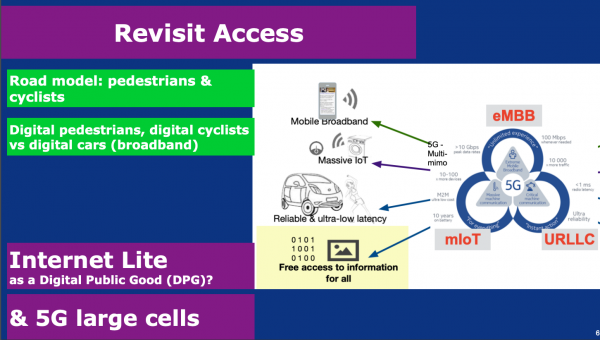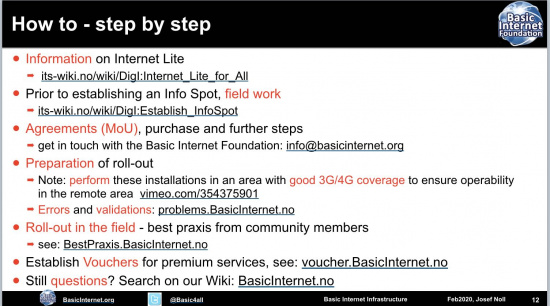Difference between revisions of "Template:BIF About"
From its-wiki.no
Josef.Noll (Talk | contribs) |
Josef.Noll (Talk | contribs) |
||
| (22 intermediate revisions by the same user not shown) | |||
| Line 1: | Line 1: | ||
= The Basic Internet Foundation = | = The Basic Internet Foundation = | ||
| − | Envision a world of free access to information on health care, | + | __NoTOC__ |
| + | '''Connect the Future:''' Envision a world of free access to information on health care, education or development. | ||
| − | Join our quest to make this vision a reality! | + | [https://www.basicinternet.org/get-involved Join our quest to make this vision a reality!] |
| − | + | Our work in the Basic Internet Foundation is driven by three questions: | |
| − | + | # Is '''access to digital goods and information''' a universal '''human right'''? | |
| − | + | # How can we '''enable access''', especially for people and groups left behind by traditional business models? | |
| + | # How can we provide '''local access to decentralised information''' to address global challenges and achieve the Sustainable Development Goals (SDGs)? | ||
| − | |||
| − | + | To answer the questions, we adopted the model of the road: '''Once a road is build, pedestrians and cyclists have free access to the road'''. And we ask ourselves: ''What hinders us to address the road model to the access to Internet?'' | |
| − | + | ||
| − | :'' | + | |
| − | + | ||
| − | :'' | + | |
| − | + | [[File:Internet_Lite_Digital_Pedestrians_and_Cyclists.png|600px|center|thumb|''Figure 1: Network slicing for Internet Lite and 5G large cells'']] | |
| − | + | * We promote and provide the '''[[Freemium_Access|Freemium model for access]]''' | |
| − | + | * We build '''[[Information spots]]''' with free access to information, and premium access to broadband services | |
| + | * Through ''Internet Lite for All'' we build the basis for '''Digital Inclusion''' and '''Societal Empowerment''' | ||
| − | [[ | + | * We see '''[[Digital Health]]''' as enabler for '''digital literacy''', '''better knowledge''' on relevant health issues, and '''social entrepreneurship'''. Energy, digital and health together form the building blocks for '''sustainable development''' |
| − | + | ||
| − | + | If you want to read more, | |
| + | * please visit our [https://www.basicinternet.org/blog/ Blog on "Internet Lite for All"] or | ||
| + | * visit our web and [https://basicinternet.org/get-involved Get involved in the work on ''Connecting the Future''] | ||
| − | + | <!---- How to question ---> | |
| − | {{ | + | {{BasicInternet:How_To}} |
| − | + | ||
| − | + | ||
| − | + | ||
| − | + | ||
| − | }} | + | |
| − | + | ||
| − | + | ||
| + | <!--- About Technology ---> | ||
| + | {{BasicInternet:Terminology}} | ||
| + | <!--- Basic Internet Meetings | ||
| + | {{BasicInternet:Meetings}} --> | ||
__NOEDITSECTION__ | __NOEDITSECTION__ | ||
Latest revision as of 20:33, 25 March 2023
The Basic Internet Foundation
Connect the Future: Envision a world of free access to information on health care, education or development.
Join our quest to make this vision a reality!
Our work in the Basic Internet Foundation is driven by three questions:
- Is access to digital goods and information a universal human right?
- How can we enable access, especially for people and groups left behind by traditional business models?
- How can we provide local access to decentralised information to address global challenges and achieve the Sustainable Development Goals (SDGs)?
To answer the questions, we adopted the model of the road: Once a road is build, pedestrians and cyclists have free access to the road. And we ask ourselves: What hinders us to address the road model to the access to Internet?
- We promote and provide the Freemium model for access
- We build Information spots with free access to information, and premium access to broadband services
- Through Internet Lite for All we build the basis for Digital Inclusion and Societal Empowerment
- We see Digital Health as enabler for digital literacy, better knowledge on relevant health issues, and social entrepreneurship. Energy, digital and health together form the building blocks for sustainable development
If you want to read more,
- please visit our Blog on "Internet Lite for All" or
- visit our web and Get involved in the work on Connecting the Future
How To?
Are you wondering on how to connect your community? We help you in establishing Information Spots by following these 5 steps.
- You want to read more on why we use Internet Lite?
- You have already plans to connect your community, your school, your health facility? Please read what has to be done in the field prior to establishing an Info Spot
- Are you convinced to establish an Info Spot? Then please contact us to make the necessary agreements (MoU), purchase and further steps mailto:info@basicinternet.org
- Thus, if everything is agreed, we help you in ordering the equipment, built a Regional Competence Centre to configure equipment ready to be installed
- See http://vimeo.com/354375901 for the steps of connectivity
- Have a look at the course on how to configure
- Experience problems? Please visit Problem solving
- 5. You are almost there, perform the roll-out in the field, and Best Praxis from our communities
Operation
- There are Web pages that should be available, but are currently blocked? Your regional administrator can manage that by adding sites to the Whitelist.
- The access is working? Then it's time for the Premium service. Read about our Voucher Platform to give out vouchers fro e.g. 1h, 4h or more. Please note that when you sell vouchers, you will need to require an ISP license.
- Experience Problems? Please revisit Problem solving
- Do you still have questions? Go through our Frequently Asked Questions (FAQ), Search on our Wiki or have a look at a presentation (.pdf) of our infrastructure.
Monitoring
- Monitoring platform based on Kibana: https://monitoring.basicinternet.org - yet to come
Our Terminology
- Information spot - An information spot provides free access to local information, and to Internet Lite
- Free access to information is based on the Freemium model for access, with free access to information and premium access to broadband services on the Internet
- Internet Lite for All is the implementation of an Internet with text and pictures, enabled through light-weight protocols such as AMP
- Digital Inclusion and leaving no-one behind are the core drivers for the free access to information for all
- Societal Empowerment through digital inclusion, with focus on keeping the value within the community
- Digital Health for Digital Empowerment - Our research has proven that digital health information not only has significant results on health knowledge, but also empowers people digitally by learning on how to use digital devices and achieve information

